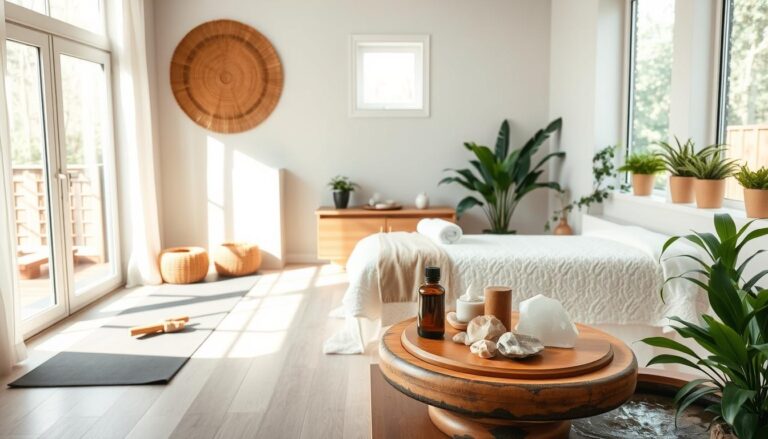In recent years, more people are turning to holistic therapy for better health. This approach looks at the whole person, covering physical, mental, emotional, and spiritual aspects. By doing so, it aims to boost long-term health and general wellness. Holistic wellness also digs deep to find what causes health problems, promoting a well-balanced way of living.
As people show more interest in holistic methods, they’re making lifestyle changes for better health. Personal, tailored care is key in treatments, especially seen in spas and wellness industries1. Holistic therapy prevents health issues too. It’s part of a bigger move towards stopping health problems before they start. Practices like yoga and mindfulness help people manage emotions better and cope well with life’s challenges2.
Such holistic treatments have proven benefits. They can cut down the chance of falling back into old habits by 40% in those recovering from addiction2. The Aliya Health Group provides these holistic services, helping people live happier and healthier3. To learn more about holistic wellness, you can check out this resource.
Understanding Holistic Wellness Care
Holistic wellness care treats people as whole beings rather than just their symptoms. It looks at the physical, mental, emotional, and spiritual parts of life as one. Through holistic health practices, patients gain deeper and longer-lasting health benefits.
What is Holistic Wellness Care?
Holistic wellness care is a full care approach that uses many therapies to boost well-being. It treats the whole person with a mix of surgery, medicine, diet changes, exercise, and other treatments like massage and acupuncture. These varied methods are tailored to meet individual needs, improving the mind-body connection and supporting natural healing abilities4. Holistic wellness care also focuses on care that respects each patient’s goals and builds respectful doctor-patient relationships45.
Principles of Holistic Wellness Care
The key principles of holistic wellness care are vital for its success. It stresses prevention and urges lifestyle changes for lasting health. Practitioners choose natural and less invasive therapies to maintain balance and harmony in a person’s life5. To help with life’s difficulties, they offer mental wellness tips and emotional support. The popularity of holistic wellness care is growing, with many seeking out thorough health solutions5.
The Components of Holistic Wellness Care
Holistic wellness care combines various aspects to promote a balanced life. Each part is important for complete health.
Physical Wellness
Physical wellness is key. It includes a healthy body through diet, exercise, and enough sleep. The National Sleep Foundation suggests adults need seven to nine hours of sleep nightly for good health6.
Good nutrition is also crucial. Sadly, 76% of adults don’t eat enough fruit, and 87% miss out on vegetables6. These habits greatly impact our vitality and energy.
Mental Wellness
Mental wellness is about your brain’s health and managing stress well. Being smart in learning and solving problems is crucial. A strong network of friends and family boosts happiness7.
Using stress-relief methods can improve mental health.
Emotional Wellness
Emotional wellness means handling your feelings to be emotionally strong. Emotional health affects your choices, friendships, and everyday life7.
Focus on therapy helps people understand themselves better and learn to cope.
Spiritual Wellness
Spiritual wellness is about connecting with your deeper self and finding purpose. This can be through mindfulness, meditation, or nature. It brings joy and better wellness overall.
Benefits of Holistic Therapy and Wellness
Holistic therapy greatly improves health. It looks at well-being from all sides: physical, emotional, and spiritual. Studies show it helps with mental health and eases depression, anxiety, stress, trauma, and chronic pain8. People who try it often feel better overall. They also lower their risk of getting long-term health issues.
Promotes Overall Health and Well-Being
Adding holistic therapy to your health routine views health as complex. Practices like yoga, acupuncture, and meditation boost fitness and mind clarity. This leads to better health that lasts9. A study in 2019 found it lowers stress, anxiety, and depression8.
Personalised Care
At its heart, holistic therapy means treatment made just for you. It blends treatments that match your values and how you live. This lets you lead your recovery10. For example, holistic mental health counselling adapts to you. It might include massage or meditation to make therapy even better10.
Focuses on Prevention
Prevention is key in holistic therapy. It promotes early action and healthy living choices. This keeps wellness a priority, not just fixing problems when they happen. Studies back up this method. It speeds up recovery and secures health for the future by dealing with social, medical, psychological, and environmental factors9. Techniques like breathwork and yoga help manage stress and build emotional strength8.
Implementing Holistic Practices in Daily Life
Adding holistic practices into your day can make you feel better all around. It’s important to eat a variety of whole foods. This improves not just your body, but your mind and feelings too. Eating nutrient-rich foods helps fight off the bad effects of poor health habits. These issues, like feeling less productive and mental health struggles, are common in our busy lives1112.
Nutritional Nourishment
Eating whole foods instead of processed ones boosts your well-being every day. Such eating habits follow old healing ways that suggest a balanced diet is key. It also says to pair this with physical and mental activities like yoga and meditation. Making good food choices helps you live a balanced life, focusing on rest, balancing work and life, and looking after your emotional health【11】.
Mindfulness and Stress Management
Along with good nutrition, practicing mindfulness is key to managing stress well. Techniques like deep breathing, meditation, and saying positive things to yourself can lower stress. They let you control your wellbeing, greatly improving how you live. Spending time on these activities helps clear your mind and makes your emotions more stable. This supports your wellness goals in the long term【11】【12】.
FAQ
What is holistic therapy and wellness?
Holistic therapy views health as a mix of physical, mental, emotional, and spiritual well-being. It aims to improve your overall quality of life and keep you vital.
How does holistic wellness care differ from traditional medicine?
Holistic care looks at the root causes of health concerns. It uses a broad strategy to improve your whole well-being, unlike traditional medicine which targets specific symptoms.
What are the key principles of holistic wellness care?
Key principles focus on how the mind affects the body, offering unique care for each person. It’s about prevention, natural treatments, and finding life’s balance.
What components are involved in holistic wellness care?
Holistic care involves looking after your physical, mental, emotional, and spiritual health. Each plays a big part in achieving total health.
What benefits can I expect from holistic therapy?
Benefits include overall health improvement, care that matches your needs, and a focus on prevention. This helps maintain your health for the long term.
How can I incorporate holistic practices into my daily life?
Begin with eating whole foods for better nutrition. Add mindfulness tasks like deep breathing and meditation. These can boost mental health and reduce stress.
Is holistic wellness care suitable for everyone?
Yes, holistic care can be tweaked to fit anyone’s health needs. It’s for people aiming for life’s balance and optimal health.
Can holistic therapy help with chronic health conditions?
Absolutely, holistic therapy treats chronic conditions by tackling root issues. It also promotes overall wellness through customized care and changes in lifestyle.





